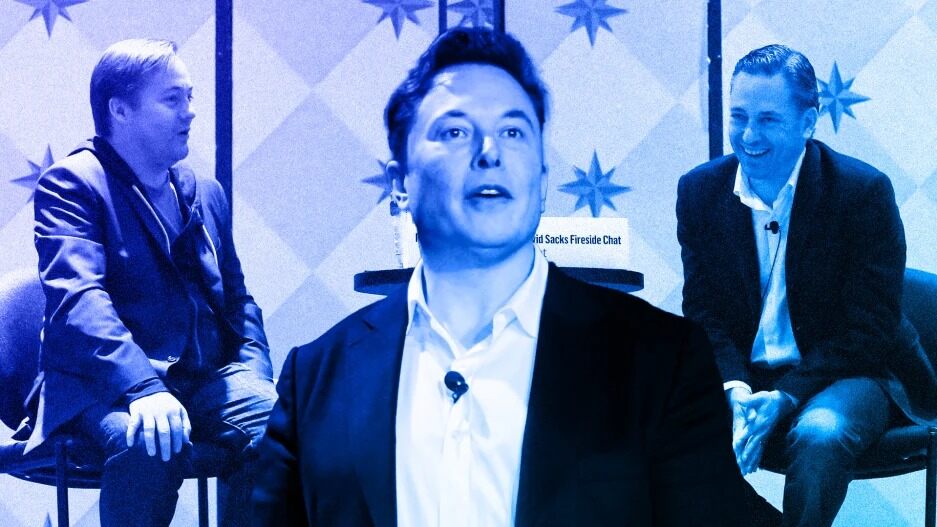- | 9:00 am
Meet the new team of advisers Elon Musk has tapped to reshape Twitter
People like Jason Calacanis and David Sacks could play a huge role in charting the social media platform’s future—for better or worse.

Hard as it can be to believe, the most cringeworthy moment in Elon Musk’s Twitter takeover wasn’t when he sauntered into the company’s offices in San Francisco carrying a sink—a joke he had to explain to make it work.
Rather, it was the surfacing of private messages as part of the court case Twitter lodged against Musk to try and compel him to take over the company—something he finally did last week. The texts highlighted just how ordinary extraordinarily rich people can be, and led to mockery for the boorish ways in which Musk’s friends and family interacted with him over the deal. And no exchange was more embarrassing than the one between Musk and Jason Calacanis, a 51-year-old podcaster and entrepreneur who got rich in the dot-com era by developing a blogging company that he sold to AOL for more than $25 million.
“Put me in the game coach! Twitter CEO is my dream job,” Calacanis wrote to Musk at one point. When Musk later chastised Calacanis for marketing Twitter to would-be investors without Musk’s knowledge, Calacanis eventually demurred, adding: “You know I’m ride or die brother—I’d jump on a grande [sic] for you.”
Well, as it turns out, all that shameless lobbying for a role ended up benefiting Calacanis (who recently changed his Twitter bio to “Chief Meme Officer, Twitter”), as he’s apparently become one of Musk’s closest confidants, part of a small group of trusted individuals who The New York Times reports are now making decisions and advising Musk as he overhauls Twitter.
The group includes Jared Birchall, who runs Musk’s family office, as well as Alex Spiro, Musk’s lawyer. The Times reports that Andreessen Horowitz partner Sriram Krishnan and venture capitalist David Sacks are also advising Musk.
Sources Fast Company spoke to are split about how the war room Musk has assembled will shape Twitter’s future. “It’s not surprising Musk would bring people he trusts to help him get a handle on what’s essentially a new business for him, as being the owner is different than being a user,” says Michael Gartenberg, a tech analyst and former venture capitalist.
Gartenberg compares Musk’s establishment of an inner circle to what Steve Jobs did upon his return to Apple, when he involved people he trusted in key decisions about whom to retain and whom to fire. “The question of course is [whether] Musk [is] getting as good advice as Jobs did,” Gartenberg says.
Many Twitter users seem to have made up their minds about the quality of that council already. News that Musk had brought in his trusted team was treated with derision by many, who were quick to point out prior failures and problems. Sacks, for one, has long been criticized for cowriting a 1996 article arguing “the most tragic side effect of affirmative action is that very significant achievements of minority students can become compromised.”
Isa Watson, founder and CEO of social media startup Squad, who knows Calacanis, worries about his past statements that racism didn’t exist in the tech world because he had never personally seen evidence of it. “The climate is very highly charged right now,” Watson says. “A lot of my Jewish friends are feeling unsafe. A lot of my minority friends are feeling unsafe. When you’re pulling in a group to strategize on how, what, and where to take Twitter next, it’s important to have representation to make sure that some of those most unprotected and most attacked groups feel protected, feel considered, and feel included.” (Neither Calacanis nor Musk had responded to requests for comment at press time.)
Another group not included in Musk’s Twitter war room? Young folks. “Twitter can create really powerful connections and community,” says Meagan Loyst, founder of Gen Z VCs, a collective of 14,000 young investors, founders, and students. “With Elon taking control and all of the press surrounding his team, I’d like to see inclusivity at the center . . . more women, Gen Z representation, and other diverse perspectives around the table.”
Yet despite the criticism, there are indeed those who think that Musk’s coterie of advisers could perhaps have deeper knowledge than the naysayers would suggest.
“I’ve gotten to know people like them over my career, innovators that got obscenely rich through a mixture of foresight and luck,” says Brianna Wu, a software engineer and executive director of progressive political action group Rebellion PAC. “What happens is they spend so much time talking to each other, they become divorced from reality—which is why you had an entire generation of Silicon Valley elite become convinced Web 3.0 would be a thing. They become so convinced they are innovators, so hostile to outside criticism, that they lose the insight that made them successful in the first place.”
Wu expresses further concerns about Musk’s confidants. “Most of them have displayed shocking levels of hostility to the press. And I think the most dangerous thing is that, based on their careers, they seem to be uninterested in the safety of women, people of color, and queer people,” she says.
It’s something that gives Watson pause, too. “I’m not sure where the future of Twitter is going. I do know for a fact that a lot of people that I talk to, across all backgrounds—white, Black, wealthy, not wealthy, tech, media, etc.—are concerned about where it’s going,” she says.
Gartenberg points out that the company’s initial few days under Musk’s ownership suggest that there are difficulties involved in the war room’s ability to take the temperature of Twitter’s restive user base. “So far, things such as paid blue checks have not gone over well, so if that’s advice that came from the war room,” he says, “perhaps he needs additional advisers.”






































